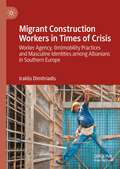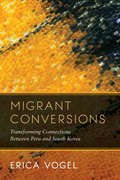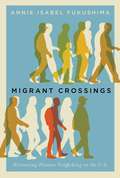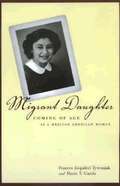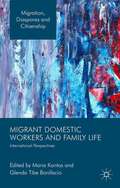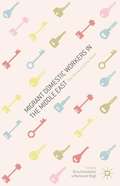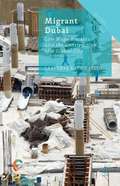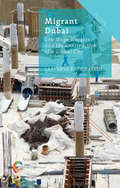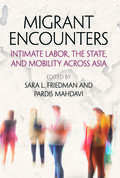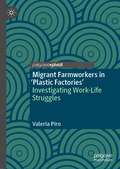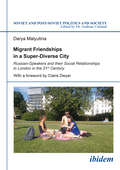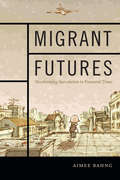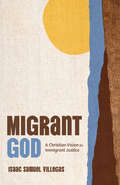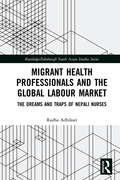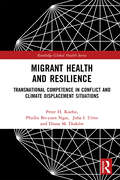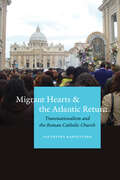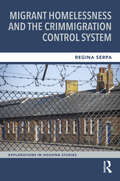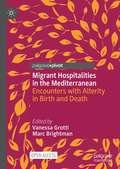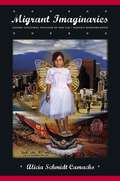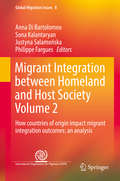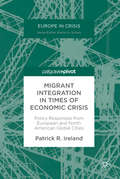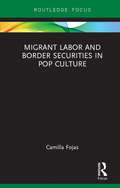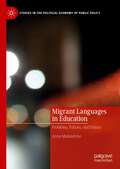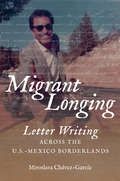- Table View
- List View
Migrant Construction Workers in Times of Crisis: Worker Agency, (Im)mobility Practices and Masculine Identities among Albanians in Southern Europe
by Iraklis DimitriadisThis book explores how migrant construction workers in Southern Europe faced unemployment and precarious work conditions during and after the Great Recession. By drawing on rich qualitative data, it investigates the experiences of Albanian men within and beyond the workplace, and sheds light on the capacity of migrant builders to deal with economic hardships and the role of their families and masculine identities in shaping their coping practices. This book suggests a new framework for the study of coping practices among migrant (construction) workers, and adds to the study of integration processes in Southern European countries by comparing the narratives of settled migrants in Italy and Greece. This book also looks at the effects of the COVID-19 pandemic on migrant builders’ lives in Southern Europe. By adopting an interdisciplinary approach, this book is of interest both to students and researchers in the field of migration studies and those working in the fields of sociology, geography, anthropology, political science and economics.
Migrant Conversions: Transforming Connections between Peru and South Korea (Global Korea #3)
by Erica VogelA free open access ebook is available upon publication. Learn more at www.luminosoa.org. Peruvian migrant workers began arriving in South Korea in large numbers in the mid 1990s, eventually becoming one of the largest groups of non-Asians in the country. Migrant Conversions shows how despite facing unstable income and legal exclusion, migrants come to see Korea as an ideal destination. Some even see it as part of their divine destiny. Faced with looming departures, Peruvians develop cosmopolitan plans to transform themselves from economic migrants into pastors, lovers, and leaders. Set against the backdrop of 2008’s global financial crisis, Vogel explores the intersections of three types of conversions— money, religious beliefs and cosmopolitan plans—to argue that conversions are how migrants negotiate the meaning of their lives in a constantly changing transnational context. At the convergence of cosmopolitan projects spearheaded by the state, churches, and other migrants, Peruvians change the value and meaning of their migrations. Yet, in attempting to make themselves at home in the world and give their families more opportunities, they also create potential losses. As Peruvians help carve out social spaces, they create complex and uneven connections between Peru and Korea that challenge a global hierarchy of nations and migrants. Exploring how migrants, churches and nations change through processes of conversion reveals how globalization continues to impact people’s lives and ideas about their futures and pasts long after they have stopped moving, or that particular global moment has come to an end.
Migrant Crossings: Witnessing Human Trafficking in the U.S.
by Annie Isabel FukushimaMigrant Crossings examines the experiences and representations of Asian and Latina/o migrants trafficked in the United States into informal economies and service industries. Through sociolegal and media analysis of court records, press releases, law enforcement campaigns, film representations, theatre performances, and the law, Annie Isabel Fukushima questions how we understand victimhood, criminality, citizenship, and legality. Fukushima examines how migrants legally cross into visibility, through frames of citizenship, and narratives of victimhood. She explores the interdisciplinary framing of the role of the law and the legal system, the notion of "perfect victimhood", and iconic victims, and how trafficking subjects are resurrected for contemporary movements as illustrated in visuals, discourse, court records, and policy. Migrant Crossings deeply interrogates what it means to bear witness to migration in these migratory times—and what such migrant crossings mean for subjects who experience violence during or after their crossing.
Migrant Daughter: Coming of Age as A Mexican American Woman
by Mario T. García Frances Esquibel TywoniakBoth introduction and narrative illustrate the process by which Tywoniak negotiated her relation to ethnic identity and cultural allegiances, the ways in which she came to find education as a channel for breaking with fieldwork patterns of life, and the effect of migration on family and culture. This deeply personal memoir portrays a courageous Mexican American woman moving between many cultural worlds, a life story that at times parallels, and at times diverges from, the real life experiences of thousands of other, unnamed women.
Migrant Domestic Workers and Family Life
by Maria Kontos Glenda Tibe BonifacioThis timely and innovative book delivers a comprehensive analysis of the non-recognition of the right to a family life of migrant live-in domestic and care workers in Argentina, Canada, Germany, Italy, Lebanon, Norway, the Philippines, Slovenia, South Korea, Spain, the United Arab Emirates, the United States of America, and Ukraine. Combining legal, sociological and social policy perspectives, it takes an interdisciplinary approach to international and national legal frameworks, the political economy of globalised reproductive labour, and the experience and coping strategies of migrant domestic and care workers. Highlighting constructed, ideological and imagined responses to life away from home, it offers theoretical, empirical and international perspectives on the right to a family life. Bringing together established and emerging scholars from a variety of academic disciplines, it focuses in particular on the voices of migrant domestic workers and their positioning as active subjects with agency to articulate their needs and claims.
Migrant Domestic Workers in the Middle East
by Bina Fernandez Marina De RegtFor over half a century, the Middle East - and the Arabian Peninsula in particular - has been major migration corridor for domestic workers from Asia and Africa. Migrant domestic workers comprise a significant proportion of the migrant labour force in these countries, in some cases, nearly fifty per cent. This volume goes beyond a discussion of the working conditions of migrant domestic workers to show the multidimensionality of their lives in the Middle East. The chapters illustrate thesewomen's varied processes of "making a home in the world," the existential transformations they undergo, and the multiple ways in which they are able to exert agency, despite the constrained choices they are often forced to make. Contributors show how the spaces these women occupy disrupt and challenge given notions of the public-private divide, re-working them as spaces of encounter and of relationships of belonging, spiritual connection, friendship, conviviality, and sociality. This volume presents a vibrant portrait of migrant domestic workers in the Middle East as more than passive victims of abuse and exploitation, showing how they (like people everywhere) are actively engaged in finding a balance between acting and being acted upon, between struggle and accommodation, closure and openness, and movement and stasis.
Migrant Dubai: Low Wage Workers and the Construction of a Global City (Global Diversities)
by Laavanya KathiraveluMigrant Dubai.
Migrant Dubai: Low Wage Workers and the Construction of a Global City (Global Diversities)
by Laavanya KathiraveluThis book analyzes the everyday lives of labour migrants in a rapidly developing city-state. Using the emirate of Dubai as a case study, Migrant Dubai shows that even within highly restrictive mobility regimes, marginalized migrants find ways to cope with structural inequalities and quotidian modes of discrimination.
Migrant Encounters: Intimate Labor, the State, and Mobility Across Asia
by Pardis Mahdavi Sara L. FriedmanMigrant Encounters examines what happens when migrants across Asia encounter both the restrictions and opportunities presented by state actors and policies, some that leave deep marks on migrants' own life trajectories and others that produce fragmentary, uneven traces. With a focus on those who migrate to perform intimate labor—domestic, care, and sex work—or whose own intimate and familial lives are redefined through migration, marriage, and sometimes parenthood, this volume argues that such encounters transform both migrants and the states between which they move.Written by an international group of anthropologists, sociologists, and geographers, these essays offer richly detailed and insightful accounts of the intimate consequences of migration and the transformative effects of migrant-state encounters across Asia. Addressing a range of topics from the fate of children born to unmarried migrant mothers to the everyday negotiations of cross-border couples and migrant domestic workers, the contributors situate themselves at various points along the extensive migration routes that extend from northeast Asia all the way to the Gulf region. The authors draw on ethnographic research and policy analysis to illustrate the texture of migrants' interactions with state actors and forces. From a range of perspectives, they explore what these encounters teach us about migrant agency and the workings of state power in a region now rife with diverse forms of cross-border mobility.Contributors: Heng Leng Chee, Nicole Constable, Sara L. Friedman, Hsiao-Chuan Hsia, Mark Johnson, Hyun Mee Kim, Pardis Mahdavi, Filippo Osella, Nobue Suzuki, Christoph Wilcke, Brenda S. A. Yeoh.
Migrant Farmworkers in 'Plastic Factories’: Investigating Work-Life Struggles
by Valeria PiroThis book provides a fine-grained ethnographic examination of the everyday negotiations and conflicts taking place in greenhouses and packinghouses in an agricultural district in south-eastern Italy (Sicily). In a highly competitive global scenario, driven by multinational corporations and large retailers, small and medium-sized farms largely rely on migrant labour to fill their demand for casualized, flexible and low-paid jobs. By taking the reader into the ‘plastic factories’ where the author was hired as a farmworker, this book sheds light on the struggles – around the employment contract, the wage and the body – which take place every day between employers and employees. The book contributes to broadening the understanding of the dynamics innervating food production worldwide by recognizing the pivotal role of migrant labour not only as a factor in the restructuring of global supply chains, but also as an actor shaping these processes through its own unpredictable strategies.
Migrant Friendships in a Super-Diverse City: Russian-Speakers and their Social Relationships in London in the 21st Century (Soviet and Post-Soviet Politics and Society #148)
by Darya MalyutinaThis timely book offers an integrative and critical approach to the conceptualization of diversity of social ties in contemporary urban migrant populations. It explores the informal relationships of migrants in London and how the construction and the dynamics of their social ties function as a part of urban sociality within the super-diversity of London. Based on the results of a qualitative study of Russian-speaking migrants, it targets the four main themes of transnationalism, ethnicity, cosmopolitanization, and friendship. Acknowledging the complexity of the ways in which contemporary migrants rely on social relationships, the author argues that this complexity cannot be fully grasped by theories of transnationalism or explanations of ethnic communities alone. Instead, one can gather a closer understanding of migrant sociality when adding the analysis of informal relationships in different locations and with different subjects. This book suggests that friendship should be seen as an important concept for all research on migrant social connections.
Migrant Futures: Decolonizing Speculation in Financial Times
by Aimee BahngIn Migrant Futures Aimee Bahng traces the cultural production of futurity by juxtaposing the practices of speculative finance against those of speculative fiction. While financial speculation creates a future based on predicting and mitigating risk for wealthy elites, the wide range of speculative novels, comics, films, and narratives Bahng examines imagines alternative futures that envision the multiple possibilities that exist beyond capital’s reach. Whether presenting new spatial futures of the US-Mexico borderlands or inventing forms of kinship in Singapore in order to survive in an economy designed for the few, the varied texts Bahng analyzes illuminate how the futurity of speculative finance is experienced by those who find themselves mired in it. At the same time these displaced, undocumented, unbanked, and disavowed characters imagine alternative visions of the future that offer ways to bring forth new political economies, social structures, and subjectivities that exceed the framework of capitalism.
Migrant God: A Christian Vision for Immigrant Justice
by Isaac Samuel VillegasMigrant God takes readers to the front lines of immigrant justice activism where Christians are putting hope into action. From Tijuana, Mexico, to Douglas, Arizona, across North Carolina and beyond, Isaac Villegas cuts a new path through worn-out talking points and bears witness to loving solidarity among Christians—both with and without US citizenship. Along the way, he offers a theologically astute and politically rich vision of beloved community. Centering the stories of people who have been transformed through their dedication to the work of collective wholeness, Villegas begins each chapter &“on the ground&”—with protests in the streets, hospitality in migrant shelters, and shared meals in home kitchens. He then engages in biblical, theological, and political reflection to explore the significance—for our faith and our world—of these sites of collective work. Migrant God is a stirring read for anyone who wants to shift conversations about immigration toward a more holistic Christian vision of life lived in solidarity with migrants.
Migrant Health Professionals and the Global Labour Market: The Dreams and Traps of Nepali Nurses (Routledge/Edinburgh South Asian Studies Series)
by Radha AdhikariThis book offers a fresh perspective on gender debates in Nepal and analyses how the international migration of the first generation of professional female Nepali nurses has been a catalyst for social change. With unprecedented access to study participants in Nepal (the source country), following them and their networks in the UK (the destination country), this ethnographic study explores Nepali nurses’ migration journeys, relocation experiences, and their international migration ‘dreams’ and aspirations. It illustrates how migrant nurses strive to manage social and professional difficulties as they work towards achieving their ultimate migration aims. The book shows that nursing shortages and international nurse migration are isseus of gender, on a global scale, and that the current trend of privatisation in health systems makes the labour market vulnerable, and stimulates international migration of health professionals. Arguing that international nurse migration is an integral part of the globalisation of health, the author highlights key policy strategies that are useful for global nursing and health workforce management. A well-informed and much-needed study of nurse migration in the global healthcare market, this book will be of interest to professionals and academics working in nursing studies, health and social care studies, gender and international migration studies, and global health studies, as well as South Asian studies.
Migrant Health and Resilience: Transnational Competence in Conflict and Climate Displacement Situations (Routledge Global Health Series)
by Peter H. Koehn Juha I. Uitto Phyllis Bo-Yuen Ngai Diana M. DiakówIn an era of escalating conflict-induced and climate-induced migration and cross-border interaction, transnational-competence (TC) preparation for displaced persons, members of their host communities, humanitarian responders, and health-care professionals is increasingly critical. Building on insights from those engaged with a range of humanitarian crises and global-justice contexts, along with multidisciplinary research findings, this cutting-edge volume provides practical guidelines for preparing stakeholders for effective short-term and long-term responses to challenges arising in the wake of population dislocation generated by armed conflict, persecution, and climate change. Addressing the need to equip humanitarian care-givers and care-receivers with valuable skills for working together across barriers and boundaries, the guidance presented in the book enables educators, trainers, and field-based multinational and local responders to enhance and evaluate the quality and sustainability of humanitarian efforts that promote and bolster resilience and belonging and augment well-being, justice, and sustainable development. It features comprehensive TC-teaching and learning strategies coupled with tailored on-site and remote approaches and methods. Authoritative and insightful, Migrant Health and Resilience will be essential reading for the staff of NGOs, international organizations, national and local governments, and professional bodies working in development and humanitarian-crisis contexts, as well as for students, higher-education instructors, scholars, and evaluators.
Migrant Hearts and the Atlantic Return: Transnationalism and the Roman Catholic Church
by Valentina NapolitanoMigrant Hearts and the Atlantic Return examines contemporary migration in the context of a Roman Catholic Church eager to both comprehend and act upon the movements of peoples. Combining extensive fieldwork with lay and religious Latin American migrants in Rome and analysis of the Catholic Church’s historical desires and anxieties around conversion since the period of colonization, Napolitano sketches the dynamics of a return to a faith’s putative center. Against a Eurocentric notion of Catholic identity, Napolitano shows how the Americas reorient Europe.Napolitano examines both popular and institutional Catholicism in the celebrations of the Virgin of Guadalupe and El Senor de los Milagros, papal encyclicals, the Latin American Catholic Mission, and the order of the Legionaries of Christ. Tracing the affective contours of documented and undocumented immigrants’ experiences and the Church’s multiple postures toward transnational migration, she shows how different ways of being Catholic inform constructions of gender, labor, and sexuality whose fault lines intersect across contemporary Europe.
Migrant Homelessness and the Crimmigration Control System (Explorations in Housing Studies)
by Regina SerpaMigrant Homelessness and the Crimmigration Control System offers new insights into the drivers of homelessness following migration by unpacking the housing consequences of ‘crimmigration’ control systems in the US and the UK. The book advances ‘housing sacrifice’ as a concept to understand journeys in and out of homelessness and the coping strategies migrants employ. Undergirded by persuasive empirical research, it offers a compelling case for a ‘social citizenship’ right to housing guaranteed across social, political and civil realms of society. The book is structured around the 30 life stories of people who have migrated to the capital cities of Boston and Edinburgh from Central America and Eastern Europe. The narratives are complemented by interviews with a range of stakeholders (including frontline caseworkers, activists and policymakers). Guided by the tenets of critical realist theory, this book offers a biographical inquiry into the intersections of race, class and gender and provides insight into the everyday precarity homeless migrants face, by listening to them directly. It will be of interest to students, scholars, and policymakers across a range of fields including housing, immigration, criminology, sociology, and human geography.
Migrant Homelessness and the Crimmigration Control System (ISSN)
by Regina SerpaMigrant Homelessness and the Crimmigration Control System offers new insights into the drivers of homelessness following migration by unpacking the housing consequences of ‘crimmigration’ control systems in the US and the UK. The book advances ‘housing sacrifice’ as a concept to understand journeys in and out of homelessness and the coping strategies migrants employ. Undergirded by persuasive empirical research, it offers a compelling case for a ‘social citizenship’ right to housing guaranteed across social, political and civil realms of society. The book is structured around the 30 life stories of people who have migrated to the capital cities of Boston and Edinburgh from Central America and Eastern Europe. The narratives are complemented by interviews with a range of stakeholders (including frontline caseworkers, activists and policymakers). Guided by the tenets of critical realist theory, this book offers a biographical inquiry into the intersections of race, class and gender and provides insight into the everyday precarity homeless migrants face, by listening to them directly. It will be of interest to students, scholars, and policymakers across a range of fields including housing, immigration, criminology, sociology, and human geography.
Migrant Hospitalities in the Mediterranean: Encounters with Alterity in Birth and Death
by Marc Brightman Vanessa GrottiThis open access book applies insights from the anthropology of hospitality to illuminate ethnographic accounts of migrant reception in various parts of the Mediterranean. The contributors ground the idea and practice of hospitality in concrete ethnographic settings and challenge how the casual usage of Derridean or Kantian notions of hospitality can blur the boundaries between social scales and between metaphor and practice. Host-guest relations are multiplied through pregnancy and childbirth, and new forms of hospitality emerge with the need to offer mortuary practices for dead strangers, helping to illuminate the spatial and scalar dimensions of morality and politics in Mediterranean migrant reception.
Migrant Imaginaries: Latino Cultural Politics in the U.S.-Mexico Borderlands (Nation of Nations #12)
by Alicia Schmidt CamachoWinner of the 2009 Lora Romero First Book Prize from the American Studies Association2009 Choice Outstanding Academic TitleExplores the transnational movements of Mexican migrants, including their expressive culture and social movement practicesMigrant Imaginaries explores the transnational movements of Mexican migrants in pursuit of labor and civil rights in the United States from the 1920s onward. Working through key historical moments such as the 1930s, the Chicano Movement, and contemporary globalization and neoliberalism, Alicia Schmidt Camacho examines the relationship between ethnic Mexican expressive culture and the practices sustaining migrant social movements. Combining sustained historical engagement with theoretical inquiries, she addresses how struggles for racial and gender equity, cross-border unity, and economic justice have defined the Mexican presence in the United States since 1910.Schmidt Camacho covers a range of archives and sources, including migrant testimonials and songs, Amrico Parede’s last published novel, The Shadow, the film Salt of the Earth, the foundational manifestos of El Movimiento, Richard Rodriguez’s memoirs, narratives by Marisela Norte and Rosario Sanmiguel, and testimonios of Mexican women workers and human rights activists, as well as significant ethnographic research. Throughout, she demonstrates how Mexicans and Mexican Americans imagined their communal ties across the border, and used those bonds to contest their noncitizen status. Migrant Imaginaries places migrants at the center of the hemisphere’s most pressing concerns, contending that border crossers have long been vital to social change.
Migrant Integration between Homeland and Host Society Volume 2
by Philippe Fargues Anna Di Bartolomeo Sona Kalantaryan Justyna SalamońskaThis book provides solid empirical evidence into the role that countries and communities of origin play in the migrant integration processes at destination. Coverage explores several important questions, including: To what extent do policies pursued by receiving countries in Europe and the US complement or contradict each other? What effective contribution do they make to the successful integration of migrants? What obstacles do they put in their way? This title is the second of two complementary volumes, each of which is designed to stand alone and provide a different approach to the topic. Here, renowned contributors present evidence from the studies of 55 origin countries on five continents and 28 countries of destination in Europe where both quantitative and qualitative research was conducted. In addition, the chapters detail results of a unique worldwide survey of 900 organisations working on migrant integration and diaspora engagement. The results draw on an innovative methodology and new approaches to the analysis of large-scale survey data. This examination into the tensions between integration policies and diaspora engagement policies will appeal to academics, policymakers, integration practitioners, civil society organisations, as well as students. Overall, the chapters provide empirical evidence that builds upon a theoretical framework developed in a complementary volume: Migrant integration between Homeland and Host society. Vol. 1. Where does the country of origin fit? by A. Unterreiner, A. Weinar. and P. Fargues.
Migrant Integration in Times of Economic Crisis
by Patrick R. IrelandThis book examines how the severe economic downturn following the 2007-2008 financial crisis affected the structural integration and quality of life of urban migrants in Europe and North America. It compares the experiences of migrants from Poland, Romania, Serbia, Pakistan, and Ghana in five similar, secondary global cities of Hamburg (Germany), Barcelona (Spain), Chicago (USA), Toronto (Ontario, Canada), and Montr#65533;al (Qu#65533;bec, Canada) over the period of 2000-2015. The work uses statistical analysis to gauge changes in residential segregation and structural integration (such as unemployment, poverty, and social assistance rates). It then provides qualitative analyses of individual city neighborhoods where the target migrant groups have settled, exploring each community's unique evolution and the ambivalent impact that local policy responses have had on their quality of life. With this study, researchers, instructors, students, and policymakers with an interest in migration, urban development, and global cities will be far more knowledgeable of both the potential and limits of policy efforts.
Migrant Labor and Border Securities in Pop Culture (Routledge Focus on Latina/o Popular Culture)
by Camilla FojasMigrant Labor and Border Securities in Pop Culture explores the conditions for migrant domestic, agricultural, and factory workers as that of continual crisis and examines how the borderlands are a workshop of neoliberalism. These borderland stories present a future of integrated networks in which the border is not just physical but temporal, separating the present time of crisis and migrant phobia, and a future of transborder interaction and settlement based on bridges and networks rather than walls and the proliferation of security technologies. Written in accessible prose for undergraduate and graduate students across American studies, immigration studies, media and cultural studies and more, this book examines the collective action seen in Latina/o cultural productions after the economic crisis and how they reach across racial and geographic lines to imagine new entities.
Migrant Languages in Education: Problems, Policies, and Politics (Studies in the Political Economy of Public Policy)
by Anna MalandrinoThis book examines language education policy in European migrant-hosting countries. By applying the Multiple Streams Framework to detailed case studies on Austria and Italy, it sheds light on the factors and processes that innovate education policy. The book illustrates an education policy design that values language diversity and inclusion, and compares underlying policymaking processes with less innovative experiences. Combining empirical analysis and qualitative research methods, it assesses the ways in which language is intrinsically linked to identity and political power within societies, and how language policy and migration might become a firmer part of European policy agendas. Sitting at the intersection between policy studies, language education studies and integration studies, the book offers recommendations for how education policy can promote a more inclusive society. It will appeal to scholars, practitioners and students who have an interest in policymaking, education policy and migrant integration.
Migrant Longing: Letter Writing across the U.S.-Mexico Borderlands (The David J. Weber Series in the New Borderlands History)
by Miroslava Chávez-GarcíaDrawing upon a personal collection of more than 300 letters exchanged between her parents and other family members across the U.S.-Mexico border, Miroslava Chavez-Garcia recreates and gives meaning to the hope, fear, and longing migrants experienced in their everyday lives both "here" and "there" (aqui y alla). As private sources of communication hidden from public consumption and historical research, the letters provide a rare glimpse into the deeply emotional, personal, and social lives of ordinary Mexican men and women as recorded in their immediate, firsthand accounts. Chavez-Garcia demonstrates not only how migrants struggled to maintain their sense of humanity in el norte but also how those remaining at home made sense of their changing identities in response to the loss of loved ones who sometimes left for weeks, months, or years at a time, or simply never returned. With this richly detailed account, ranging from the Mexican Revolution of the 1910s to the emergence of Silicon Valley in the late 1960s, Chavez-Garcia opens a new window onto the social, economic, political, and cultural developments of the day and recovers the human agency of much maligned migrants in our society today.
